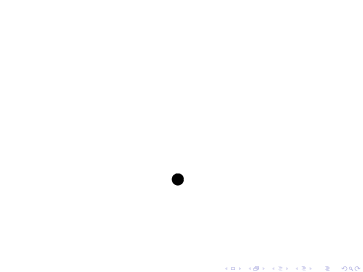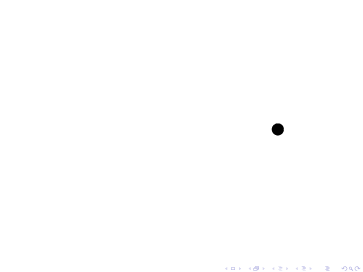$value = $start + $t*($end - $start)where $t evolves uniformly from 0 to 1 during the active interval of an object.
However, aximate allows you to modify this evolution by specifying the function of $t according to which a certain option should evolve. This is done by providing a second (referenced) hash to the object. For example, a jumping ball can be represented as:
point({"coordinates" => [[-100,-50],[0,100]],
"interval" => [0,50]},
{"coordinates" => ['$t','(1-$t)**2']});
point({"coordinates" => [[0,100],[100,-50]],
"interval" => [50,100]},
{"coordinates" => ['$t','$t**2']});

$num = 10;
$norm = 0;
foreach $i (1..$num) {
$norm += 1/sqrt(2**$i);
}
$bound1 = 0;
$bound2 = 0;
foreach $i (1..$num) {
$bound2 += 100/$norm/sqrt(2**$i);
$bound3 = $bound1 + 100/$norm/sqrt(2**$i)/2;
point({"coordinates" => [[0,-50],[0,100/2**($i-1)-50]],
"interval" => [$bound1,$bound3]},
{"coordinates" => ['$t','(1-$t)**2']});
point({"coordinates" => [[0,100/2**($i-1)-50],[0,-50]],
"interval" => [$bound3,$bound2]},
{"coordinates" => ['$t','$t**2']});
$bound1 = $bound2;
}
}

- If both the $start and the $end value is given,
and f(1) ≠ f(0), the evolution function is
scaled so that $start and $end are reached:
evol($t) = $start + (f($t)-f(0))/(f(1)-f(0))*($end-$start) - If both the $start and the $end value is given,
and f(1) = f(0), a linear function is added
so that $start and $end are reached:
evol($t) = f($t) - f(0) + $start + $t*($end-$start)Note that this means that even if f($t) = const, the values will evolve linearly from the $start to the $end. - If the $end value is missing, it is assumed to be equal to the $start value.
- If the $end value is given but empty (i.e. []),
and the $start value is given and not empty, the evolution
function is
evol($t) = $start + f($t) - f(0) - If the $start value is given but empty (i.e. []),
and the $end value is given and not empty, the evolution
function is
evol($t) = $end + f($t) - f(1) - If both the $start and the $end value is given
but empty (i.e. []), the evolution
function is
evol($t) = f($t)
point({"coordinates" => [[],[]]},
{"coordinates" => ['100*cos(2*pi*$t)','100*sin(2*pi*$t)']});
NB: Note that the same result can be achieved through
point({"coordinates" => [[0,0]],
"polar" => [[100,0],[100,360]]})
